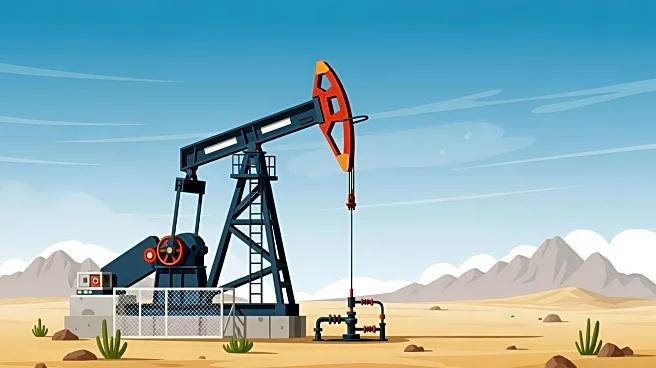What's Happening?
Chevron Corporation has reported record oil and gas production for the third quarter of 2025, largely driven by the integration of assets from its recent acquisition of Hess Corporation. The company's
global production increased by 21% year-over-year, reaching 4.1 million barrels of oil equivalent per day, marking its highest output on record. The acquisition of Hess contributed significantly to this growth, adding 495,000 barrels of oil equivalent per day. Chevron's legacy operations also saw an increase, contributing an additional 227,000 barrels of oil equivalent per day. Key developments include the first oil production at the Yellowtail development in Guyana's offshore Stabroek Block and the sanctioning of the Hammerhead project, further solidifying Chevron's presence in emerging oil provinces.
Why It's Important?
The integration of Hess Corporation's assets into Chevron's operations is a strategic move that enhances Chevron's position as a leading global energy company. This acquisition not only boosts Chevron's production capabilities but also strengthens its foothold in high-potential regions such as Guyana, which is rapidly becoming a significant player in the global oil market. The increased production capacity and expanded exploration agreements in regions like Peru and Guinea-Bissau highlight Chevron's commitment to growing its international presence. This development is likely to have substantial implications for the global energy market, potentially affecting oil prices and influencing energy policy decisions.
What's Next?
Chevron is expected to continue integrating Hess's assets, focusing on unlocking synergies across its operations. The company is likely to pursue further exploration and development projects in promising regions, aiming to capitalize on its expanded portfolio. Stakeholders, including investors and industry analysts, will be closely monitoring Chevron's performance and strategic decisions as it navigates the complexities of the global energy landscape. Additionally, Chevron's ongoing expansion in LNG supply agreements and natural gas exports may lead to increased competition in these sectors.
Beyond the Headlines
The acquisition and subsequent production increase underscore the growing importance of strategic mergers and acquisitions in the energy sector. As companies seek to enhance their capabilities and market positions, such moves can lead to significant shifts in industry dynamics. Chevron's focus on international acreage and LNG expansion reflects broader trends towards diversification and sustainability in energy production. These developments may also prompt discussions on the environmental impact of increased fossil fuel production and the balance between energy needs and climate commitments.








